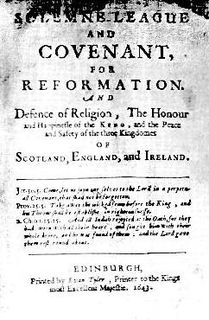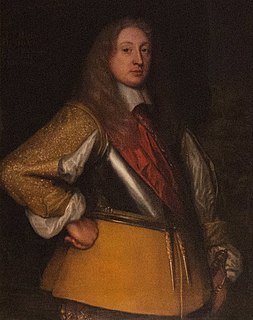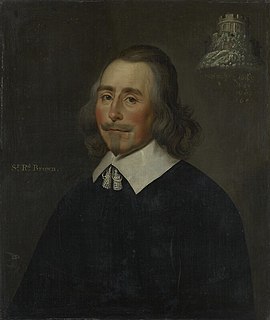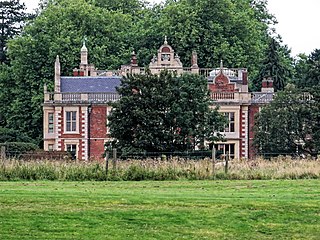
The English Civil War (1642–1651) was a series of civil wars and political machinations between Parliamentarians ("Roundheads") and Royalists ("Cavaliers"), mainly over the manner of England's governance and issues of religious freedom. It was part of the wider Wars of the Three Kingdoms. The first (1642–1646) and second (1648–1649) wars pitted the supporters of King Charles I against the supporters of the Long Parliament, while the third (1649–1651) saw fighting between supporters of King Charles II and supporters of the Rump Parliament. The wars also involved the Scottish Covenanters and Irish Confederates. The war ended with Parliamentarian victory at the Battle of Worcester on 3 September 1651.

Robert Devereux, 3rd Earl of Essex, KB, PC was an English Parliamentarian and soldier during the first half of the 17th century. With the start of the Civil War in 1642 he became the first Captain-General and Chief Commander of the Parliamentarian army, also known as the Roundheads. However, he was unable and unwilling to score a decisive blow against the Royalist army of King Charles I. He was eventually overshadowed by the ascendancy of Oliver Cromwell and Thomas Fairfax, and resigned his commission in 1646.

The Solemn League and Covenant was an agreement between the Scottish Covenanters and the leaders of the English Parliamentarians in 1643 during the First English Civil War, a theatre of conflict in the Wars of the Three Kingdoms. On 17 August 1643, the Church of Scotland accepted it and on 25 September 1643 so did the English Parliament and the Westminster Assembly.

Denzil Holles, 1st Baron Holles PC was an English statesman, best remembered as one of the Five Members whose attempted arrest by Charles I in January 1642 sparked the First English Civil War.
The Battle of Nantwich was fought on 25 January 1644 in Cheshire during the First English Civil War. In the battle, Sir Thomas Fairfax in command of a Parliamentarian relief force defeated Lord Byron and the Royalists.

The Irish Confederate Wars, also called the Eleven Years' War, took place in Ireland between 1641 and 1653. It was the Irish theatre of the Wars of the Three Kingdoms, a series of civil wars in the kingdoms of Ireland, England and Scotland – all ruled by Charles I. The conflict had political, religious and ethnic aspects and was fought over governance, land ownership, religious freedom and religious discrimination. The main issues were whether Irish Catholics or British Protestants held most political power and owned most of the land, and whether Ireland would be a self-governing kingdom under Charles I or subordinate to the parliament in England. It was the most destructive conflict in Irish history and caused 200,000–600,000 deaths from fighting as well as war-related famine and disease.

Confederate Ireland, also referred to as the Irish Catholic Confederation or Confederacy, was a period of Irish Catholic self-government between 1642 and 1649, during the Eleven Years' War. Formed by Catholic aristocrats, landed gentry, clergy and military leaders after the Irish Rebellion of 1641, the Confederates controlled up to two thirds of Ireland from their base in Kilkenny; hence it is sometimes called the "Confederation of Kilkenny".

Basil Feilding, 2nd Earl of Denbigh was a diplomat, politician and parliamentarian army officer during the English Civil War. He was the eldest son of William Feilding, 1st Earl of Denbigh and Susan Feilding, Countess of Denbigh.

Philip Wharton, 4th Baron Wharton was an English soldier, politician and diplomat. He was a Parliamentarian during the English Civil War.
The Committee of Both Kingdoms,, was a committee set up during the Wars of the Three Kingdoms by the Parliamentarian faction in association with representatives from the Scottish Covenanters, after they made an alliance in late 1643.

Robert Greville, 2nd Baron Brooke was a radical Puritan activist and leading member of the opposition to Charles I of England prior to the outbreak of the First English Civil War in August 1642. Appointed Parliamentarian commander in Staffordshire and Warwickshire, he was killed by a Royalist sniper at Lichfield on 2 March 1643.

Sir Richard Browne, 1st Baronet was a London businessman who became a major-general in the Parliamentary army during the English Civil War, but opposed The Protectorate. He was subsequently Lord Mayor of London after the Stuart Restoration.
Events from the year 1645 in England. This is the fourth year of the First English Civil War, fought between Roundheads (Parliamentarians) and Cavaliers.

Sir Thomas Barrington, 2nd Baronet, 1585 to 18 September 1644, was an English politician and Puritan activist who sat in the House of Commons at various times between 1621 and 1644. In the early stages of the First English Civil War, he helped establish the Eastern Association, one of the most effective elements of the Parliamentarian army.

Cornwall played a significant role in the English Civil War, being a Royalist enclave in the generally Parliamentarian south-west.

The Battle of Weymouth and the associated Crabchurch Conspiracy occurred in 1645, during the First English Civil War, when several royalist plotters within the twin towns of Weymouth and Melcombe on the Dorset coast conspired to deliver the ports back into the control of King Charles I.

Boy was a white hunting poodle belonging to Prince Rupert of the Rhine in the 17th century. Parliamentarian propaganda alleged that the dog was "endowed" with magical powers.

William Ogle, 1st Viscount Ogle was an English soldier from Northumberland who settled in Hampshire and was Member of Parliament for Winchester from 1640 to 1643. He served in a number of wars and was Royalist governor of Winchester from 1643 to 1645.
This is a timeline for the English Civil War in Shropshire.

Sir Thomas Ogle was a sergeant-major involved in a plot to draw both Roman Catholics and Independents in attempt to reconvene the English Parliament at Oxford, to the benefit of Charles I and the detriment of the Roundheads.















